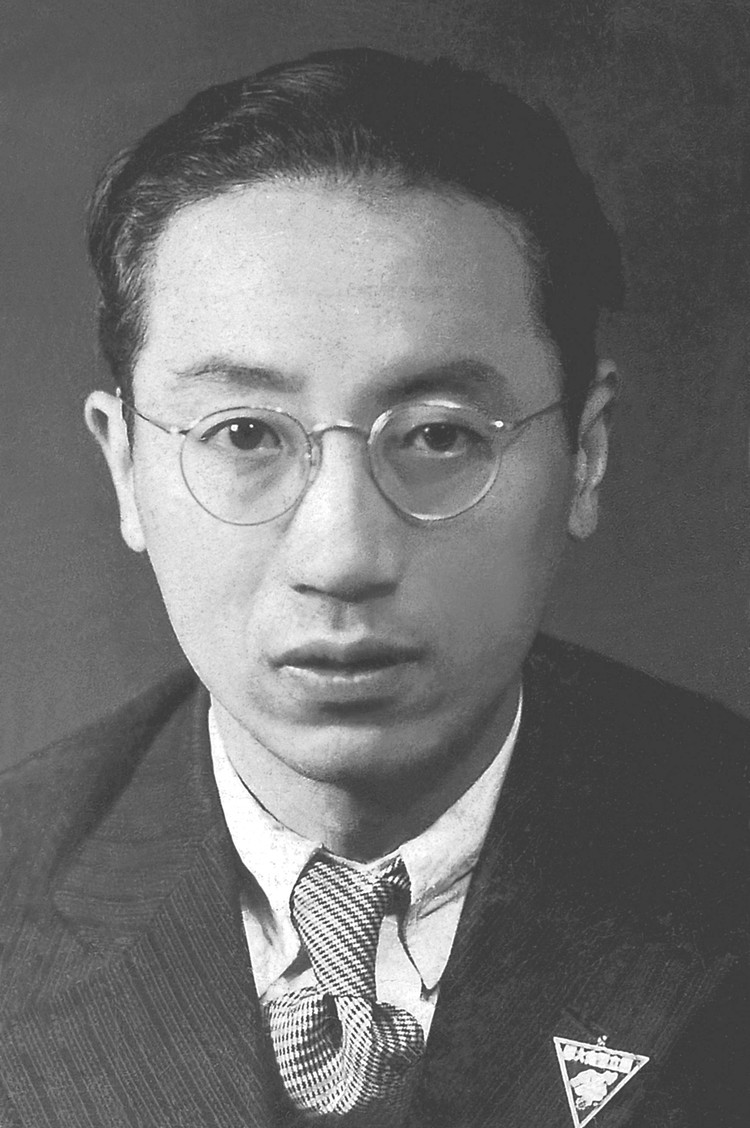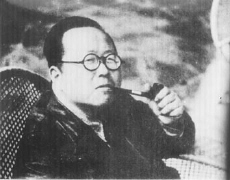|
Fei Xiaotong
Fei Xiaotong or Fei Hsiao-tung (November 2, 1910 – April 24, 2005) was a Chinese anthropologist and sociologist. He was a pioneering researcher and professor of sociology and anthropology; he was also noted for his studies in the study of China's ethnic groups as well as a social activist. Starting in the late 1930s, he and his colleagues established Chinese sociology and his works were instrumental in laying a foundation for the development of sociological and anthropological studies in China, as well as in introducing social and cultural phenomena of China to the international community. His last post before his death in 2005 was as Professor of Sociology at Peking University. Early years Fei Xiaotong was born in Wujiang County of Jiangsu province in China on November 2, 1910. His world was one plagued with political corruption and abject poverty. He grew up in a gentry but yet not wealthy family. His father, Fei Pu'an () was educated in the Chinese classics, earned ... [...More Info...] [...Related Items...] OR: [Wikipedia] [Google] [Baidu] |
Wujiang District, Suzhou
Wujiang District (; Suzhounese: ''Wukaon Chiu''), formerly Wujiang City, is one of five urban districts in Suzhou, Jiangsu province. As the southernmost county-level division of Jiangsu, it borders Shanghai to the northeast and Zhejiang province to the south and southwest. The total area of Wujiang is 1176.68 square kilometers, with a population of 1.5 million. Wujiang is currently one of the most economically successful cities in China. Songling (), a town located at the centre of Wujiang, serves as the seat of the district government. Geography A portion of Lake Tai is situated in Wujiang district. Numerous historical canals are located in Wujiang district. Historic Lili village is located in Wujiang. The government has announced that Wujiang will be designated as Taihu New City. Administration divisions In the present, Wujiang District has 1 subdistrict and 8 towns. Subdistrict * Binhu () Town * Lili () * Qidu () * Shengze () * Pingwang () * Songling () * Taoyuan () ... [...More Info...] [...Related Items...] OR: [Wikipedia] [Google] [Baidu] |
Yenching University
Yenching University (), was a university in Beijing, China, that was formed out of the merger of four Christian colleges between the years 1915 and 1920. The term "Yenching" comes from an alternative name for old Beijing, derived from its status as capital of the state of Yan, one of the seven Warring States that existed until the 3rd century BC. History Yenching University was formed through the merger of four Christian schools over the course of five years, from 1915 to 1920: * Hweiwen University (), also known as the Methodist Peking University, founded in 1890 by the Methodist Episcopal Church. This should not be confused with the National Peking University founded eight years later in 1898. Huiwen's precursor (崇內懷理書院) was founded in 1870. Hiram Harrison Lowry was its principal. * North China Union College in Tongzhou (). Its precursor (公理會潞河書院) was founded by the Congregational Church. Devello Z. Sheffield was the school's principal. *North Chin ... [...More Info...] [...Related Items...] OR: [Wikipedia] [Google] [Baidu] |
University Of Chicago
The University of Chicago (UChicago, Chicago, U of C, or UChi) is a private research university in Chicago, Illinois. Its main campus is located in Chicago's Hyde Park neighborhood. The University of Chicago is consistently ranked among the best universities in the world and it is among the most selective in the United States. The university is composed of an undergraduate college and five graduate research divisions, which contain all of the university's graduate programs and interdisciplinary committees. Chicago has eight professional schools: the Law School, the Booth School of Business, the Pritzker School of Medicine, the Crown Family School of Social Work, Policy, and Practice, the Harris School of Public Policy, the Divinity School, the Graham School of Continuing Liberal and Professional Studies, and the Pritzker School of Molecular Engineering. The university has additional campuses and centers in London, Paris, Beijing, Delhi, and Hong Kong, as well as in downtown ... [...More Info...] [...Related Items...] OR: [Wikipedia] [Google] [Baidu] |
Chinese Social Relations
Chinese social relations are typified by a reciprocal social network. Often social obligations within the network are characterized in familial terms. The individual link within the social network is known by ''guanxi'' (关系/關係) and the feeling within the link is known by the term ''ganqing'' (感情). An important concept within Chinese social relations is the concept of face, as in many other Asian cultures. A Buddhist-related concept is ''yuanfen'' (缘分/緣分). As articulated in the sociological works of leading Chinese academic Fei Xiaotong, the Chinese—in contrast to other societies—tend to see social relations in terms of networks rather than boxes. Hence, people are perceived as being "near" or "far" rather than "in" or "out". See also * Culture of China ** Chinese tea culture ** Kowtow ** Red envelope ** Chinese marriage ** Sifu Shifu () in Mandarin, or sifu in Cantonese, or sai hu in Hokkien, is a title for, and the role of, a skillful person or a mas ... [...More Info...] [...Related Items...] OR: [Wikipedia] [Google] [Baidu] |
Functionalism (sociology)
Structural functionalism, or simply functionalism, is "a framework for building theory that sees society as a complex system whose parts work together to promote solidarity and stability". This approach looks at society through a macro-level orientation, which is a broad focus on the social structures that shape society as a whole, and believes that society has evolved like organisms. This approach looks at both social structure and social functions. Functionalism addresses society as a whole in terms of the function of its constituent elements; namely norms, customs, traditions, and institutions. A common analogy, popularized by Herbert Spencer, presents theses parts of society as "organs" that work toward the proper functioning of the "body" as a whole. In the most basic terms, it simply emphasizes "the effort to impute, as rigorously as possible, to each feature, custom, or practice, its effect on the functioning of a supposedly stable, cohesive system". For Talcott Parsons ... [...More Info...] [...Related Items...] OR: [Wikipedia] [Google] [Baidu] |
Alfred Reginald Radcliffe-Brown
Alfred Reginald Radcliffe-Brown, FBA (born Alfred Reginald Brown; 17 January 1881 – 24 October 1955) was an English social anthropologist who helped further develop the theory of structural functionalism. Biography Alfred Reginald Radcliffe-Brown was born Alfred Reginald Brown in Sparkbrook, Birmingham, England, the second son of Alfred Brown (d.1886), a manufacturer's clerk, and his wife Hannah (née Radcliffe). He later changed his last name, by deed poll, to Radcliffe-Brown, Radcliffe being his mother's maiden name. He was educated at King Edward's School, Birmingham, and Trinity College, Cambridge (B.A., 1905; M.A., 1909), graduating with first-class honours in the moral sciences tripos. At Trinity College, he was elected Anthony Wilkin student in 1906 and 1909. While still a student, he earned the nickname "Anarchy Brown" for his close interest in the writings of the anarcho-communist and scientist Peter Kropotkin. :"Like other young men with blood in their veins, I ... [...More Info...] [...Related Items...] OR: [Wikipedia] [Google] [Baidu] |
Bronisław Malinowski
Bronisław Kasper Malinowski (; 7 April 1884 – 16 May 1942) was a Polish-British anthropologist and ethnologist whose writings on ethnography, social theory, and field research have exerted a lasting influence on the discipline of anthropology. Malinowski was born in what was part of the Austrian partition of Poland, and completed his initial studies at Jagiellonian University in his birth city of Kraków. From 1910, at the London School of Economics (LSE), he studied exchange and economics, analysing Aboriginal Australia through ethnographic documents. In 1914 he traveled to Australia. He conducted research in the Trobriand Islands and other regions in New Guinea and Melanesia where he stayed for several years, studying indigenous cultures. Returning to England after World War I, he published his principal work, ''Argonauts of the Western Pacific'' (1922), which established him as one of Europe's most important anthropologists. He took posts as lecturer and later as chair ... [...More Info...] [...Related Items...] OR: [Wikipedia] [Google] [Baidu] |
London School Of Economics
, mottoeng = To understand the causes of things , established = , type = Public research university , endowment = £240.8 million (2021) , budget = £391.1 million (2020–21) , chair = Susan Liautaud , chancellor = The Princess Royal(as Chancellor of the University of London) , director = The Baroness Shafik , head_label = Visitor , head = Penny Mordaunt(as Lord President of the Council '' ex officio'') , students = () , undergrad = () , postgrad = () , city = London , country = United Kingdom , coor = , campus = Urban , free_label = Newspaper , free = '' The Beaver'' , free_label2 = Printing house , free2 = LSE Press , co ... [...More Info...] [...Related Items...] OR: [Wikipedia] [Google] [Baidu] |
Guangxi
Guangxi (; ; Chinese postal romanization, alternately romanized as Kwanghsi; ; za, Gvangjsih, italics=yes), officially the Guangxi Zhuang Autonomous Region (GZAR), is an Autonomous regions of China, autonomous region of the People's Republic of China, located in South China and bordering Vietnam (Hà Giang Province, Hà Giang, Cao Bằng Province, Cao Bằng, Lạng Sơn Province, Lạng Sơn, and Quảng Ninh Provinces) and the Gulf of Tonkin. Formerly a Provinces of China, province, Guangxi became an autonomous region in 1958. Its current capital is Nanning. Guangxi's location, in mountainous terrain in the far south of China, has placed it on the frontier of Chinese civilization throughout much of History of China, Chinese history. The current name "Guang" means "expanse" and has been associated with the region since the creation of Guang Prefecture in 226 AD. It was given Administrative divisions of the Yuan dynasty, provincial level status during the Yuan dynasty, but ev ... [...More Info...] [...Related Items...] OR: [Wikipedia] [Google] [Baidu] |
White émigré
White Russian émigrés were Russians who emigrated from the territory of the former Russian Empire in the wake of the Russian Revolution (1917) and Russian Civil War (1917–1923), and who were in opposition to the revolutionary Bolshevik communist Russian political climate. Many white Russian émigrés participated in the White movement or supported it, although the term is often broadly applied to anyone who may have left the country due to the change in regimes. Some white Russian émigrés, like Mensheviks and Socialist-Revolutionaries, were opposed to the Bolsheviks but had not directly supported the White Russian movement; some were apolitical. The term is also applied to the descendants of those who left and who still retain a Russian Orthodox Christian identity while living abroad. The term "émigré" is most commonly used in France, the United States, and the United Kingdom. A term preferred by the émigrés themselves was first-wave émigré (russian: link= no, эми ... [...More Info...] [...Related Items...] OR: [Wikipedia] [Google] [Baidu] |
Pan Guangdan
Pan Guangdan (; 1898–1967) known in English as Quentin Pan, was a Chinese sociologist, eugenicist, and writer. He was one of the most distinguished sociologists and eugenicists of China. Educated at Tsinghua University on a Boxer Indemnity Scholarship, Dartmouth College and Columbia University, where he was trained by Charles B. Davenport, Pan was also a renowned expert on education. His wide research scope included eugenics, education policy, matrimony policy, familial problems, prostitute policy, and intellectual distributions. Pan's wide-ranging intellect led to his active participation in the Crescent Moon Society. Pan's most famous student was Fei Xiaotong, the "father of Chinese anthropology." Career Pan joined the China Democratic Groups League (later China Democratic League) in 1941, and was a standing committee member of the central committee of the League. During the Anti-Rightist Movement, he was determined to be a "rightist." Pan was persecuted in Cultural Revolut ... [...More Info...] [...Related Items...] OR: [Wikipedia] [Google] [Baidu] |




.jpg)

